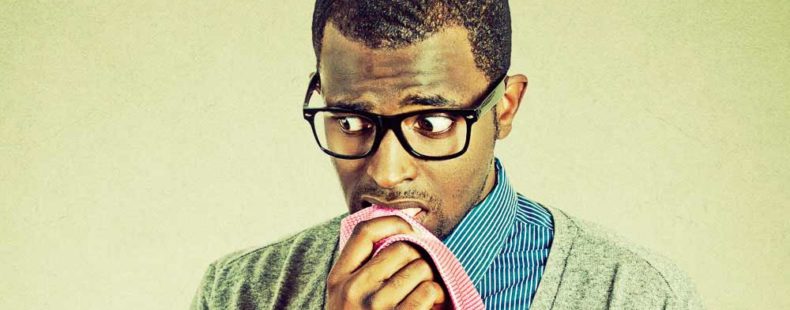Ever trip over a sidewalk curb? Fall down a step? Bump into someone on the street? Push a door the wrong way?
What’s your first verbal instinct in these moments of surprise? Is it to blurt out some onomatopoetic non-word (QZ.com refers to them quite accurately as “interjections, exclamations, non-lexical conversational sounds”). Well, whatever they are called, we know a few gut-reaction examples (that have actually become defined words because they are used so much!) that will perfectly describe that moment when you get caught off-guard.
Say you’re at the ballgame carrying a tray of beers, and you accidentally bump someone’s knee as you’re scooching by to your seat. “Ope!”, you blurt out as your beers slosh all over you. This one might be a regionalism to the midwest area, specifically Michigan, but we love it so it made the first slot on our list.
It’s kind of like oops (another in-the-moment expression), and often used when meaning to say “sorry,” or “excuse me.” Funnily enough, ope is actually a word (it’s merely an abbreviation for the word open) . . . but, we doubt you midwesterners are trying to say “open” when you blurt out this funny phrase in the moment.
Homer Simpson, the patriarch of the long-running Fox TV show The Simpsons, blurts out this one-word signature line to express dismay or irritation. And, did you know this one was a legitimate word (it is in the dictionary) a bit before Homer’s time: It originated in the 1950s with the same meaning!
Perhaps, the merging of the words duh with oh, d’oh is one of those words that is usually accompanied by an embarrassed, decisive slap to the forehead.
![]() Meh. Automatically triggers feelings of boredom or being unimpressed with something or someone, right? Indeed, our definition hits it right on the spot: “an expression of boredom or apathy.” A pretty fun one to say when you have nothing nice to say at all. (This one also appeared in The Simpsons. D’oh!)
Meh. Automatically triggers feelings of boredom or being unimpressed with something or someone, right? Indeed, our definition hits it right on the spot: “an expression of boredom or apathy.” A pretty fun one to say when you have nothing nice to say at all. (This one also appeared in The Simpsons. D’oh!)
Contemplating a big (or small) decision? Wondering what you would do in a certain situation. Hmm.Hmm also has a definition now: “used typically to express thoughtful absorption, hesitation, doubt, or perplexity.” It’s the sound you make when you’re thinking about something, and you want others to know you’re considering the options. In fact, this one has been blurted out by so many people during these times of indecision it’s now a staple of written messages too—to show the same type of contemplation. Language evolution indeed.
Now, that you’ve debated your decision with that hmm, you’ve come to a definitive answer: uh-huh. Uh by itself means “used to indicate hesitation, doubt, or a pause.” Its companion, huh, is used as “an exclamation of surprise, bewilderment, disbelief, contempt, or interrogation.” Put them together and you get the classic rejoinder, uh-huh!
According to etymonline.com, the positive (yet non-committal) use of uh-huh has been in use since 1904. Fun fact: the negative uh-uh has been around since 1924.
You’re at the theater watching the new Star Wars movie, and the fanboys sitting beside you are going positively bonkers. You give them a stern look and a “Shhh!”
Well, this common non-word may have come from baby-rearing. Moms often use this noise to calm fussy babies as it is supposed to resemble the sound of the womb. And, the first instance of the use of shh was recorded in 1840–50, so it has been a way to urge silence for a long time.
A friend emails you a picture of a quokka. Your immediate reaction (along with everyone else in the world with a pulse) is “Aw.” This can’t-help-it expression is now a word as well: Aw means “used to express sentimental or sugary approval.”
However, it’s first meaning (from 1888) was “used to express protest, disbelief, disgust, or commiseration,” like “aw, man.” Looks like this word has two types of guttural associations.
Perhaps, you discover a 10-dollar bill in a pair of pants you haven’t worn in a long time. Or, you remember the password to your email account one try before getting locked out. In either case, this is your “aha! moment.”
We define aha as “used as an exclamation of triumphant discovery, mockery, contempt, irony, surprise, etc., according to the manner of utterance.” (Music Tip: a-ha, in lower-case italics with a hyphen, was a popular band on MTV back in the 1980s. They’re past their moment though).
This one’s a guttural response to pain and frustration often used by the main character in Peanuts: Charlie Brown.
Lucy: (sweetly) “Oh, Charlie Brown! Come kick the football!” Charlie Brown gives this a good think and we get to hear the conversation inside his head. “Oh, no. Not again. I’ll go running up and at the last minute she’ll pull the ball away and I’ll kill myself.”
We all know what happens next. He goes running up, she pulls it away at the very last second, and he goes flying up in the air with a big anguished aaugh before slamming (once again) to the ground. And, so it goes. Good grief.
![]()
This one has a definition, but it’s also merely a one-syllable sound. Primarily used in Scotland, you make it in the back of your throat (like clearing phlegm), and it’s used to indicate surprise and disbelief.
Example: Set in some gloomy, foggy, chilly town on the Scottish coast, with mournful foghorns echoing in the distance, “Och, did I see Nessie? I did that!” (Ach also works here.)Want some more comical relief? Read our list of the funniest real words for more laughs.














